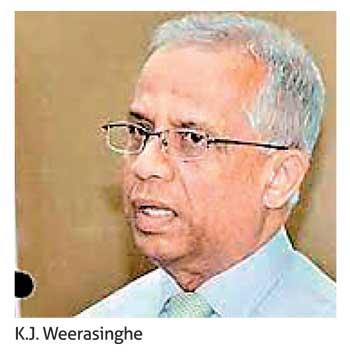Reply To:
Name - Reply Comment
By Nishel Fernando
 The negotiations for the proposed China-Sri Lanka Free Trade Agreement (FTA) are expected to resume within the next one to two months after a six-year hiatus.
The negotiations for the proposed China-Sri Lanka Free Trade Agreement (FTA) are expected to resume within the next one to two months after a six-year hiatus.
“We are waiting for official communication from China on dates for the next round of FTA negotiations,” Sri Lanka’s International Trade Office Chief Negotiator K.J. Weerasinghe told a seminar organised by the National Chamber of Exporters, in Colombo, yesterday.
Speaking to Mirror Business on the sidelines of the seminar, he shared that the sixth round of China-Sri Lanka FTA negotiations are likely to begin within the next one to two months.
President Ranil Wickremesinghe is set to make an official visit to China in October.
China and Sri Lanka launched negotiations for the proposed FTA in 2014. The last round (fifth) of negotiation was held in Colombo, in early 2017.
The FTA negotiations with China stalled in 2018 over disagreements on the pace of liberalising of the country’s economy.
“China wants a 90 percent liberalisation but industries in Sri Lanka are too sensitive to liberalise 8,000 odd tariff lines,”
Weerasinghe said.
Last year, Wickremesinghe advised the authorities to take measures to resume all FTA talks.
Weerasinghe noted that the two parties have been communicating virtually on the tariff reduction modality over the past couple
of months.
The government has launched a series of sector-wise consultations to finalise the negative list for the proposed FTA.
“So, we are preparing a negative list, items that are not subjected to tariff reductions. We have appointed a committee chaired by K.A. Vimalenthirarajah, who is Director General of the Trade and Investment Policy Department, for this,” he added.
Weerasinghe said China has agreed to liberalise bilateral goods trade based on equity and balancing of trade principles. In 2022, Sri Lanka imported US $ 3.52 billion worth of goods from China while exports to China amounted to only US $ 253.11 million.
Sri Lanka has proposed to China to liberalise 90 percent of goods over a period of 20 years, including immediate liberalisation of 50 percent of tariff lines, followed by 10 percent more in the fifth year and so on.
In addition, the government is also looking at partial reduction of tariffs on certain goods, instead of full liberalisation.
“Partial reduction is also possible; we are negotiating to go for 85 percent liberalisation and 5 percent partial liberation, over a 20-year period,” Weerasinghe said.
On parallel goods, he said consultations are underway to identify priority sectors for liberalisation.
He noted that service sector liberalisation can be carried out in a more targeted manner, with more precision, in order to meet the national requirements while protecting employments and local businesses.
Weerasinghe noted that the National Productivity Commission and trade adjustment packages would play a key role in preparing the local businesses for global competition, following liberalisation.
“Partial reduction is also possible; we are negotiating to go for 85 percent liberalisation and 5 percent partial liberation, over a 20-year period,” Weerasinghe said.
On parallel goods, he said consultations are underway to identify priority sectors for liberalisation. He noted that service sector liberalisation can be carried out in a more targeted manner, with more precision, in order to meet the national requirements while protecting employments and local businesses.
Weerasinghe noted that the National Productivity Commission and trade adjustment packages would play a key role in preparing the local businesses for global competition, following liberalisation.
